- Home
- Machines ▾
- About Us
- Request a Quote
- Videos ▾
- News & Articles
- Customer Support
Acasi Machinery manufactures some of the best bottle capping machines in the world, we are focused on the bottling industries requiring bottle capping machinery that can produce from 10 to 200 bottles per minute.
One of our best sellers is our inline capper model trucap. This capping machine can handle a wide range of caps and containers without change parts and is more forgiving and easier to set up than most bottle capping equipment in the industry.
When choosing a bottle capping machine you need to take into consideration many factors like capping speed, bottle material, and shape, compatibility between bottle and caps.
On plastic bottle cappers, it’s very important to take into consideration deformation that may happen when the capper is holding the bottles to prevent rotation when applying the required torque. There are many solutions for this type of bottle capping problems and it will depend on the shape, rigidity, holding spots among others.
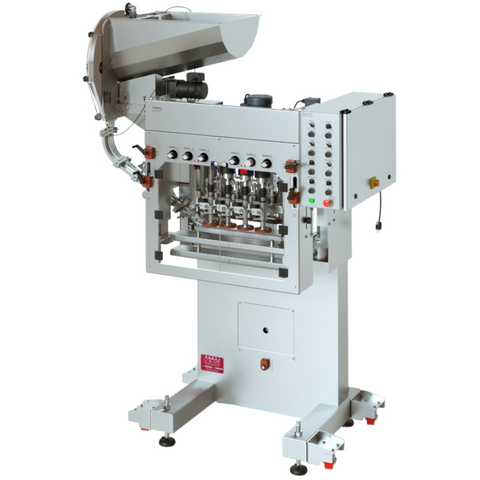
ACASI Inline Bottle Capper with Vertical wheel cap feeder
Model TruCap-X-Vert
Starting Prices:
Tightener Features:

ACASI Inline Bottle Capper with Vertical wheel cap feederModel TruCap-X-Vert Starting Prices: ...
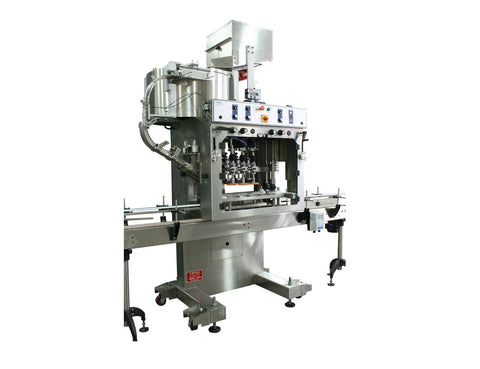

ACASI Inline Bottle Capper with Centrifugal cap feederModel TruCap-X-Cent Starting Prices: 4 spindle in line capper...
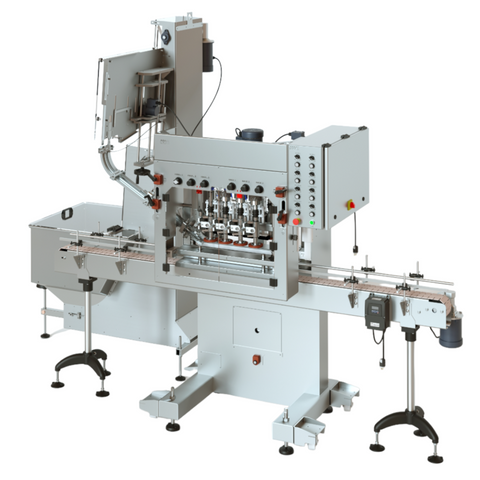
Tightener Features:
Capping discs features:
Bottle belts features:
Waterfall feeder features:
Electric and pneumatic requirements:

ACASI Inline Bottle Capper with Waterfall cap feeder Model TruCap-X-WFall Starting Prices: 4 spindle in line...
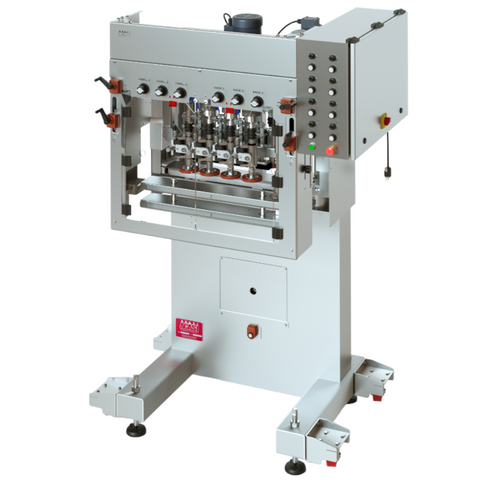
Tightener Features:
Capping discs features:
Bottle belts features:
Electric and pneumatic requirements:

ACASI Inline Bottle Cap Tightener Model TruCap Starting Prices:4 Spindle TruCap-4:6 Spindle TruCap-6:8 Spindle TruCap-8:...
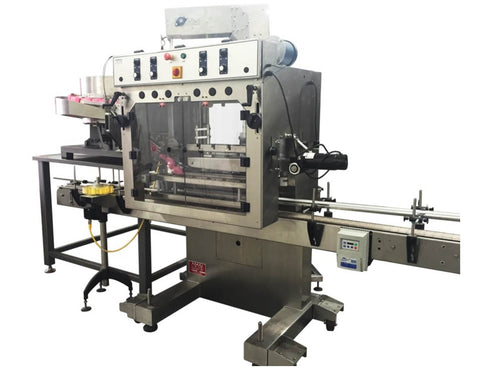
ACASI Inline Bottle Capper with Vibratory Cap Feeder
Model TruCap-X-Vib
Starting Prices:
Tightener Features:
Vibratory cap feeder features:
Cap hopper feature:
Electric and pneumatic requirements:

ACASI Inline Bottle Capper with Vibratory Cap FeederModel TruCap-X-Vib Starting Prices: ...
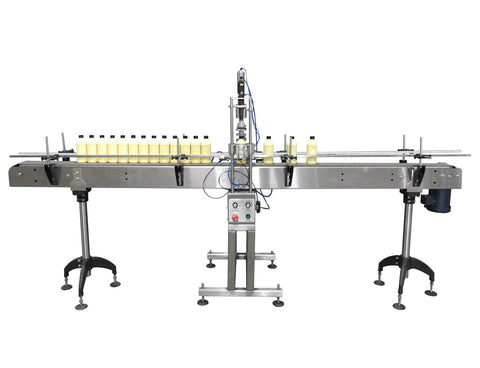
ACASI Machinery manufactures capping machines and bottle capper equipment in both automatic and handheld models.
Automatic Single Head Cap Tightener Model AS-CS16
Features:
Electric and pneumatic requirements:
110 Volts, 60Hz, 15 Amps.
20 CFM @ 80 p.s.i.

ACASI Machinery manufactures capping machines and bottle capper equipment in both automatic and handheld models....
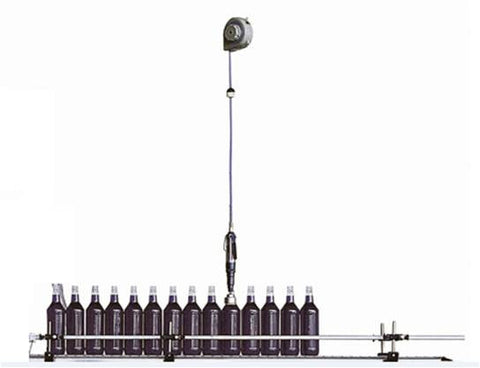
ACASI Machinery manufactures capping machines and bottle capper equipment in both automatic and handheld models.
Hand held bottle capper Model CS1000
Features:

ACASI Machinery manufactures capping machines and bottle capper equipment in both automatic and handheld models....
Capping machines can present challenges and each bottle and cap will behave differently, that’s why having a bottle capper that is forgiving, easy to set up, and flexible is so important. Keep in mind that bottle cap machines tend to be the hardest part of your bottling line, we recommend when you purchase these cap machines that you visit and inspect the machine while you get training. Each project is different and there will always be a % of miss capped bottles. We do our best to increase the accuracy of the capping and we normally don’t charge for some custom work that may be required.
One of the main features of our bottle cap machine is the ability of the capping discs to pivot in and out on each container providing more surface contact as well as adjustability and better torque control
We offer different systems that can help you automate miss-capped containers coming out of your bottle cap machinery like bottle rejects, heigh inspection, among others.
Here are the top 10 reasons:
We offer the best value for your money, our capping machines are better built, designed and can achieve competitive prices because of our volumes as well as owning our own machine shop.
Our spring loaded capping disc design is MUCH better than fixed spindle machines
Our extensive, heavy duty use of stainless steel will guarantee that you will have a machine operational for many years
Easy Bottle belt adjustable in, out, up, and down with handles
A proven design by constantly improving and debugging even small problems and functionality of our machines.
Torque adjustment while the cap machine is in operation with our pneumatic clutch option.
We offer different cap feeding systems to accommodate a wide range of bottles and caps.
Many options to accommodate every project like reverse spindle, power height, U channel, double belt
We offer online spare parts where you can buy all the parts you may require without having to talk to anyone or waiting for a call back.
We offer great support via phone or we can provide a tech in your facility.
Each project is different so it’s not that easy to respond, in general:
Inline Bottle Cappers are better when:
A wide range of containers/caps are used
Speeds less than 150 bottle capping per minute
Small and medium production runs
When flexibility in bottle cappers capping machines is important, new projects on chuck cappers require change parts, capping heads, infeed screws and is not only expensive but it takes a lot of time to manufacture this part
Limited budget since Inline cappers are less expensive
Chuck Cappers (Chuck Capping Systems) are better when:
When cap design cannot be picked up by the bottle (Like a laundry cap with dispensing)
A limited type of bottles and same caps are used
Speeds of more than 150 bottle capping per minute
Large production runs
Better torque control and/or cap placement is required
A larger budget is possible
Setting up automatic capping machines without cap feeding (Tightener) is very easy and it only takes a few minutes but it requires manual labor so if it’s a small production run of a few hundred or a couple of thousand bottles it may be more efficient to just place those caps by hand.
If production runs are longer you will find that taking the time to set up your capper and investing on a good bottle capper machine with cap feeding will pay for itself very quickly.
There are many factors to take into consideration to choose the right cap feeder, here are the most important:
How many different cap capper sizes and designs you intend to run
Required cap capping feeding speed
Space constraints
Changeover time
Cost
Depending on these and other factors the best feeder may be:
Vertical wheel (pin style)
Waterfall cap feeder (great for large flat caps)
Vibratory cap feeder (only solution for some odd shape caps)
Pocket sorter (inexpensive solution for tall caps)
Centrifugal cap feeder (flexible but harder to setup)
This is a very common unexpected problem for companies starting to do capping with induction bottle sealing.
When the bottle passes the induction cap sealer and the adhesive and foil heat up and it gets bonded with the bottle, when this happens the foil that stopped the cap going - threading down shrinks loosening up the cap in the sealing machine.